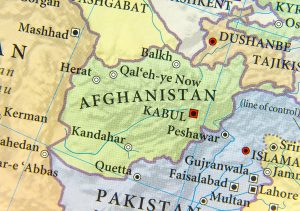On April 16, Pakistan conducted air raids across its border with Afghanistan, claiming to strike Tehrik-e Taliban Pakistan (TTP) militants operating in the porous border regions. Two days later, the Islamic State’s regional affiliate, ISKP, claimed to have fired 10 rockets at an Uzbek military base in Termez (the Uzbek government denied the attack took place.) The next week, a border crossing between Afghanistan and Iran was closed following a “dispute” between Taliban and Iranian border guards, reportedly over a road the Taliban wanted to build. An Iranian military vehicle was seized by Taliban border guards. The border reopened a day later but tensions linger.
The Taliban is beset on all sides by difficult borders and the group’s inability to bring them under control may serve to complicate relations with regional neighbors.
One major issue, worth its own exploration, is the persistence and growth of the Islamic State Khorasan Province (ISKP), now less an offshoot of the Islamic State than its inheritor. In Afghanistan, the Islamic State has considerable ungoverned spaces to fill and thus room to recruit and grow. This was, and remains, a major concern for the international community. ISKP’s devastating attack during the U.S. evacuation of Kabul last August blasted the group back into the forefront. Its subsequent attacks, particularly those targeting Hazaras in the heart of Kabul, have challenged the Taliban’s claim to control in Afghanistan.
Earlier this week, ISKP claimed to have fired rockets over the Afghan border into Tajikistan, yet another illustration of the Taliban’s lack of control of Afghanistan’s borders. For the time being, Afghanistan’s Central Asian neighbors are maintaining an air of patience and calm. Uzbekistan’s authorities denied similar reports of an ISKP rocket attack in mid-April. Tajik authorities likewise rebuffed the claims of a rocket attack with a statement mentioning bullets, not rockets, fired “accidentally” over the border during a fight between Taliban and ISKP militants.
For a region that has consistently repeated warnings that the Afghan conflict would “spill over” into Central Asia for the last 20 years, Tashkent and Dushanbe have been remarkably calm. The Taliban never espoused regional ambitions, but ISKP’s ideology is much broader, its ambitions distinctly regional.
The Pakistan border is especially important for Afghanistan, and particularly problematic. The Taliban are discovering (as is Islamabad) that harboring, or tolerating, a militant group targeting your neighbor is not a great path toward stable bilateral relations.
The TTP, often referred to as the Pakistani Taliban, share ideological links with the Afghan Taliban and analysts note that the Afghan Taliban has proven unwilling to crack down on the Pakistani group, despite Islamabad’s hopes. The Afghan Taliban’s efforts to mediate talks between the TTP and Islamabad yielded a temporary ceasefire last December. But once the ceasefire lapsed, attacks resumed, and with them increasingly strident remarks from Pakistani officials about “terrorists” operating in Afghanistan to attack Pakistan.
Another area of deterioration is the Iran border, where the Taliban face a less ideologically aligned government. In December 2021, Iranian border guards and Taliban fighters clashed. Last month, Iran appeared to increase its military presence along the border. And, as noted above, continued disputes between Iranian and Taliban border guards have ratchet tensions on the border higher.
So far, the Taliban-Pakistan relationship has not ruptured, but conditions are not improving. The same is true of the Taliban-Iran relationship but with less history to bind the two together for much longer. Meanwhile, the states of Central Asia may see the Taliban as the only present option for preventing ISKP from fulfilling its regional ambitions and for achieving the kind of stability necessary for economic prosperity in the larger region. Countries don’t get to choose their neighbors.

































